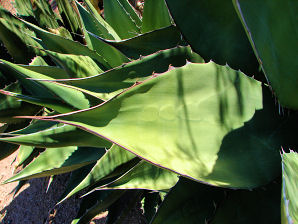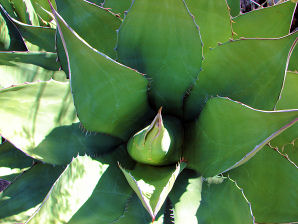Xeriscape Landscape Plants & Flowers
For The Arizona Desert Environment.
Pictures, Photos, Images, Descriptions, & Reviews.
Coastal Century Plant, Agave shawii.
We Are Proud Of Our SafeSurf Rating!
Click On Any Of The Following Links By Amazon.Com
For Books, & Videos About Wildflowers Of Arizona & The Southwest USA. No Obligation!
 |
| Coastal Century Plant, Agave shawii. Flowering Photos: Arizona-Sonora Desert Museum. April 19, 2008. |
|---|
| Coastal Century Plant, Agave shawii. Flowering Photos: Arizona-Sonora Desert Museum. April 19, 2008. |
 |
| Coastal Century Plant, Agave shawii. Phoenix Desert Botanical Garden. March 3, 2008. |
 |  |
| Coastal Century Plant. Agave shawii. | Coastal Century Plant. Agave shawii. |
|---|
 /
/

Coastal Century Plant.
We wish to thank Wikipedia, the free encyclopedia for some of the information on this page. We share images and information with Wikipedia. Agave shawii, occasionally called Shaw's Agave is an agave found only along the Pacific coast of Baja California, extending north into the coastal chaparral of southernmost California. The population within California that was confirmed as naturally occurring, was located near the Border Field State Park. It was destroyed by the Federal Government using the Department of Homeland Security's national security policy that allowed the destruction in order to construct the triple fence designed to prevent immigrants from coming over the border from Mexico. Agave shawii is a perennial fleshy plant that has gray-green lance shaped leaves 4 - 8 inches wide and 16 - 30 inches long. The leaves have marginal teeth about 1/2 inch long and with spine - like tips 1 - 1/2 inches long. Coastal Century Plant grows to about 3 feet tall and after several years it produces a flower spike about 9 - 15 feet tall. Its yellow flowers open from September to May and are carried on a long stalked inflorescence that has a pyramidal arrangement to the flower clusters and produces 18 - 25 lateral branches.
Quick Notes:
Height: Up to 3 feet feet tall. It also spreads about 5 to 6 feet.
Flowers: A 9 - 15 foot stalk emerges from the center of the plant. Then yellow - orange flowers emerge from the inflorescence of the stalk on 18 - 25 lateral branches. Then suckers develop into new plants.
Flowering Time: Phoenix Arizona, Mid March - April. It blooms only when the plant is about 15 years old. Then dies.
Leaves: The leaves form a basal rosette, they grow up to 2 1/2 feet long, and nearly 8 inches wide, gray-green, lance-shaped; wider in the middle, and tapering to the tip, with dark brown, decorative teeth. They curve both, away from, and back, towards the center of the plant.
Found: Nativeof Southern California, Baja California (Mexico). The USDA claims it is native to the USA (CA).
Hardiness: It will freeze past the low 20 �F ! *However some sources say it will survive down to 18 �F.
Soil pH requirements:
Sun Exposure:
Elevation: 0 - 2,800 Feet. In Arizona.
Habitat: It grows well in sand, sandy loam, clay and other heavy soils. It needs good drainage and aeration. It is remarkably tolerant of alkali. Cold Hardy.
Miscellaneous: Maintenance: Low. Photos Taken at Phoenix Arizona Desert Botanical Garden. March 3, 2008. Flowering Photos: Arizona-Sonora Desert Museum. April 19, 2008.
|
We Are Proud Of Our SafeSurf Rating!
We Are Proud Of Our SafeSurf Rating!



Click On Any Of The Following Links By Amazon.Com
For Books, & Videos About Xerioscape Plants Of Arizona & The Southwest USA. No Obligation!
Back To Arizona Xeriscape Landscaping Main Page.
Back To Xeriscape Succulents Page Seven.
Back To Arizona Wild Flowers Home Page.
Back To DeLange Home Page
© 1966 - Present, Audrey, Eve, & George DeLange
| © 1966 - Present, Audrey, Eve, & George DeLange |


